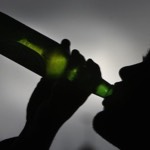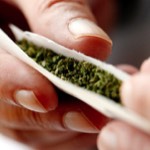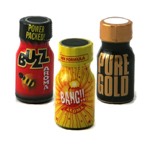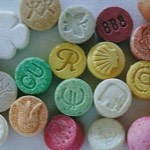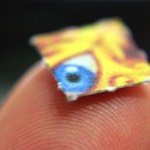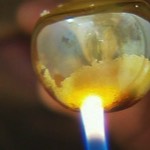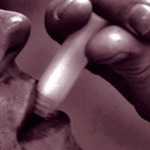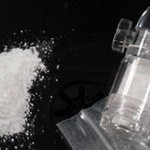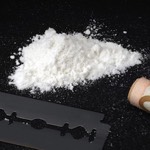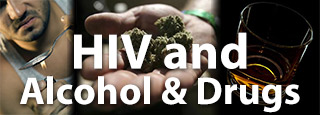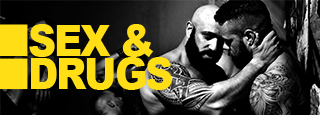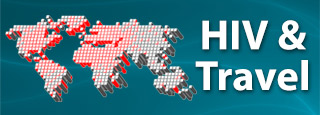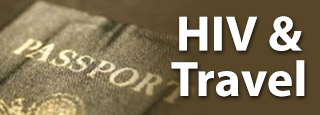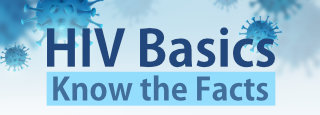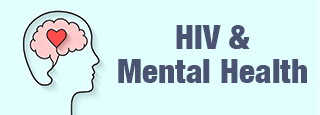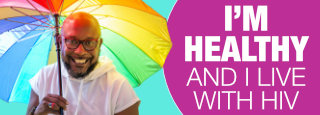HIV and Alcohol & Drugs
If you are living with HIV, you may wonder what alcohol and other "recreational" drugs will do to your body. (Recreational drugs are drugs that aren't used for medical purposes, such as alcohol, cocaine, and pot.)
You may be wondering whether drugs are bad for your immune system. And how do recreational drugs interact with your HIV medications? Each person is different, and a lot depends on which drugs you use and how often you use them.
You may be wondering whether drugs are bad for your immune system. And how do recreational drugs interact with your HIV medications? Each person is different, and a lot depends on which drugs you use and how often you use them.
Although it is difficult to say whether small amounts of alcohol or recreational drugs are harmful, most experts would agree that, in large amounts, drugs and alcohol are bad for your immune system and your overall health. Remember, if you have HIV, your immune system is already weakened.
Here, you can read about what alcohol and drugs can do to your overall health.
Here, you can read about what alcohol and drugs can do to your overall health.
Effects on your immune system
Drinking too much alcohol can weaken your immune system. A weaker immune system will have a harder time fighting off common infections (such as a cold), as well as AIDS-related infections. A weaker immune system also increases the chance that you will experience more side effects from your HIV medications.
Smoking marijuana (pot) or any other drug irritates the lungs. You may be more likely to get serious lung infections, such as pneumonia.
Smoking marijuana (pot) or any other drug irritates the lungs. You may be more likely to get serious lung infections, such as pneumonia.
Other common recreational drugs, such as cocaine or crystal methamphetamine (also known as "meth," "speed," "crank" etc), can leave your body dehydrated and exhausted, as well as lead to skin irritation. Methamphetamines also cause mouth dryness and can contribute to tooth loss. All of these things can make it easier for you to get infections.
Most people are willing to take some risks, and using drugs and alcohol is no exception. But when alcohol or other drugs become an escape upon which you rely upon, it can be dangerous to your mental and physical health.
Effects on your liver
The organ in your body that alcohol and other drugs affect most is your liver. The liver rounds up waste from chemicals that you put in your body. Those chemicals include recreational drugs as well as prescription drugs, such as your HIV medications. A weaker liver means less efficient "housekeeping" and, probably, a weaker you.
If you also have hepatitis B or C infection (or any other kind of hepatitis), your liver is already working very hard to fight the disease itself and deal with the strong drugs that you may be taking for your hepatitis and HIV treatment. Frequent or large amounts of alcohol can damage the liver and are particularly harmful if you have hepatitis B or C infection, because alcohol can speed up the damage to the liver and contribute to development of cirrhosis (severe scarring of the liver). Daily marijuana use has also been associated with more liver damage in people with viral hepatitis.
Interactions with your HIV medications
The liver is responsible for breaking down and getting rid of waste products from many HIV medications. When you are taking HIV treatment, it is important that your liver works as well as possible.
In addition, once you are HIV infected, your body may react differently to alcohol and drugs. Many people find that it takes longer to recover from using pot, alcohol, or other recreational drugs than it did before they had HIV.
Remember that having HIV means a major change has taken place in your body. You may choose to use alcohol and drugs in moderation, but be sure to respect your body. Pay attention to what and how much you eat, drink, smoke, and take into your body.
In addition, once you are HIV infected, your body may react differently to alcohol and drugs. Many people find that it takes longer to recover from using pot, alcohol, or other recreational drugs than it did before they had HIV.
Remember that having HIV means a major change has taken place in your body. You may choose to use alcohol and drugs in moderation, but be sure to respect your body. Pay attention to what and how much you eat, drink, smoke, and take into your body.
Certain HIV medications can boost the level of recreational drugs in your system in unexpected and dangerous ways. For example, amphetamines (such as crystal meth) can be present at 3 to 22 times their normal levels in the bloodstream when mixed with an HIV protease inhibitor drug called ritonavir (Norvir). That's because ritonavir hampers the body's ability to break down these other drugs. Levels of Viagra (sildenafil) and related medications that are used for erectile dysfunction are also raised by the HIV protease inhibitors and should be taken at decreased dosages to reduce the risk of toxic side effects.
If you are going to mix a recreational drug with any medication, it is better to start with a very low amount of the recreational drug (as low as one-fourth the normal amount) and allow time to see how it affects you before increasing the amount. Keep in mind that, as recreational drugs aren't regulated, you never know exactly how much you are getting.
Although you may feel uncomfortable at first, you should tell your doctor what recreational drugs you are using. That way, your doctor will know how the substances you are using affect your HIV drugs and your overall health. Most likely, telling your doctor will help him or her to understand some of the things that are going on in your body.
Although you may feel uncomfortable at first, you should tell your doctor what recreational drugs you are using. That way, your doctor will know how the substances you are using affect your HIV drugs and your overall health. Most likely, telling your doctor will help him or her to understand some of the things that are going on in your body.
Drugs, alcohol, and tobacco
Certain drugs, such as methamphetamine, affect your ability to make decisions.
Even if you use condoms regularly and practice safer sex when you're not high, you may be willing to take more risks and fail to use a condom when you're under the influence of methamphetamine or other drugs.
Even if you use condoms regularly and practice safer sex when you're not high, you may be willing to take more risks and fail to use a condom when you're under the influence of methamphetamine or other drugs.
Alcohol also can affect the decisions you make about safer sex. For example, if you have too much to drink, you may not be able to remember where you put the condoms, and decide simply not to use them. These are decisions you probably would not make if you were sober.
These actions put your partner at risk of HIV and put you at risk of other sexually transmitted infections.
Remember to keep condoms handy in places where you might have sex. Also, try to limit the amount of alcohol and drugs you use if you know you are going to have sex.
These actions put your partner at risk of HIV and put you at risk of other sexually transmitted infections.
Remember to keep condoms handy in places where you might have sex. Also, try to limit the amount of alcohol and drugs you use if you know you are going to have sex.
Before you drink or use drugs, it is important to think about what risks you are willing to take.
HIV and injection drug use
Sharing a needle when injecting drugs is dangerous for you and for the people with whom you are sharing. They could get HIV from you, and you could get another disease, such as hepatitis, from them.
The safest option is not to share. Use clean needles each time or keep your own needles to yourself.
Because of the dangers of injection drug use, the best way to lower your risk is to stop injecting drugs and to enter and complete a substance abuse treatment plan. You can talk to your doctor about this.
The safest option is not to share. Use clean needles each time or keep your own needles to yourself.
Because of the dangers of injection drug use, the best way to lower your risk is to stop injecting drugs and to enter and complete a substance abuse treatment plan. You can talk to your doctor about this.
If you do inject drugs, follow these reminders:
- Never reuse or "share" syringes, water, or drug preparation equipment.
- Use only syringes obtained from a reliable source (such as drugstores or needle exchange programs).
- Use a new, sterile syringe each time to prepare and inject drugs.
- If possible, use sterile water to prepare drugs; otherwise, use clean water from a reliable source.
- Use a new or disinfected container ("cooker") and a new filter ("cotton") to prepare drugs.
- Clean the injection site with a new alcohol swab prior to injection.
- Safely dispose of syringes after one use.
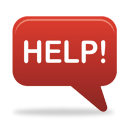
If you find that you can not control your use of alcohol or other drugs, would like to cut back or stop or would like any other support in this area, Body Positive may be able to help.
To talk to us about getting help, please contact us on 0800 HIV LINE
The NZ Drug Foundation has resources on being safer when using alcohol or drugs. They have also released The Level as a straight up guide for people who use drugs.
Join Body Positive
By becoming a member you will be able to access all the services we offer, as well as support and updates to help you live better.
Newsletter
Want to be keep up with whats happening at Body Positive?
Subscribe to our newsletter below by submitting your e-mail address.
Subscribe to our newsletter below by submitting your e-mail address.


